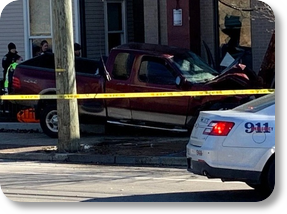
The Louisville Metro Police Department has again changed its policy on when officers can chase a fleeing vehicle, reversing course and rejoining departments among the more strict in the country in allowing pursuits.
The new policy, which took effect April 26 according to an internal memo written by Chief Erika Shields, is a rollback to a policy enacted in December 2012 to reduce deaths and injuries caused by the chases.
As part of the 2012 change, LMPD officers could only pursue suspects involved with a violent felony. Otherwise, the chase had to be called off.
Police even had to stop, turn around and drive the opposite direction to show the suspect they are not being followed. (That does not appear in the recent policy change.)
And the number of collisions and deaths plummeted.
Seven people were killed as a result of pursuits in the five years before the policy. After the policy change, there were no deaths related to police chases. Total police chases dropped by over half, according to a WDRB investigation.
But in June 2019, citing an increase in stolen vehicles and violent crime, then-Chief Steve Conrad reverted to a previous policy allowing officers to pursue vehicles that had been confirmed stolen.
In announcing the pursuit policy change at the time, Conrad wrote that the effort is meant to "prevent these criminals from terrorizing our community."
Conrad said too many criminals were using stolen cars in drive-by-shootings. He said the policy would be evaluated to determine if changes were needed.
A January 2020 investigation by The Courier-Journal revealed that after the policy was revised, police chases rose 52 percent, seven people had been killed and the number of people injured had more than doubled. In addition, lawsuits against the department were piling up.
In her recent memo, Shields wrote that "pursuits present one of the most dangerous terrains in our profession and it is imperative that involved officer(s) and their supervisors are vigilant in assessing, re-assessing, and adjusting as events unfold."
LMPD released this statement to WDRB News:
"LMPD's top priority remains protecting the public and addressing violent crime. To that end, there must be balance against the reality that very few people in our community are committing acts of violence. The pursuit policy adjustment furthers LMPD's mission of removing dangerous criminals from the streets while ensuring that our officers are not pursuing offenders for non-violent crimes. Stolen vehicles can be recovered by other measures that do not jeopardize the safety of motorists and pedestrians in our community."
So once again, to chase a vehicle, officers must have a reason to believe the person committed a violent felony or is wanted for committing a violent felony.
Police can also pursue a suspect if he is known by officers as someone who has committed a violent felony in the past or is under investigation for allegedly committing a violent felony, according to the policy.
The policy outlines violent felonies as assault, murder, rape and robbery, among others.







